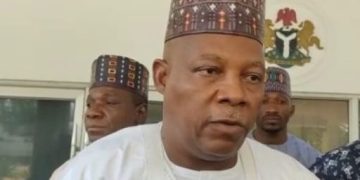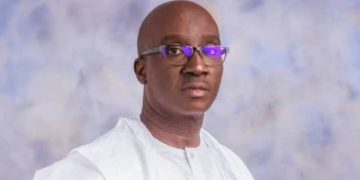The Federal Government borrowed more over N1.15 trillion between January and August 2022. According to a copy of the Minister of Finance, Budget, and National Planning, Mrs Zainab Ahmed’s public presentation of the anticipated budget for 2023, the Federal Government expected to borrow N6.10 trillion in 2022.
The Federal Government expected to collect N3.53 trillion from domestic creditors and N2.57 trillion from international creditors, according to the breakdown. According to the report, the Federal Government expects to borrow N4.07 trillion between January and August 2022.
However, the Federal Government incurred N5.33 trillion in debt during the review period, N1.15 trillion more than the N4.07 trillion expected.
The Federal Government borrowed N4.82 trillion from domestic creditors and N510.21 billion from overseas creditors, according to a detailed breakdown. The debt owed by domestic creditors comprises the Federal Government’s borrowing from the Central Bank of Nigeria through Ways and Means Advances.
Ways and Means Advances are credit instruments utilized by the CBN to fill government budget shortages. The Federal Government borrowed a total of N4.61 trillion from the Central Bank of Nigeria through Ways and Means Advances between January and August 2022.
This implies that the Federal Government’s debt to the CBN constituted the great majority of its domestic debt.
The CBN says on its website that the Federal Government’s borrowing from it through the Ways and Means Advances could have adverse effects on the bank’s monetary policy to the detriment of domestic prices and exchange rates.
“The direct consequence of central banks’ financing of deficits are distortions or surges in monetary base leading to adverse effects on domestic prices and exchange rates i.e macroeconomic instability because of excess liquidity that has been injected into the economy,” it says.
In November of last year, the World Bank urged the Nigerian government against funding deficits by borrowing from the CBN through the Ways and Means Advances, citing budgetary constraints on the country’s spending.
Despite the advice of experts and organizations, the Federal Government has continued to borrow from the CBN to cover budget shortfalls.
Furthermore, the N22.07tn owed to the apex bank by the Federal Government is not included in the country’s overall public debt stock, which stood at N42.84tn as of June 2022, according to the Debt Management Office. Nigeria’s debt climbed by N30.72 trillion between July 2015 and June 2022, according to DMO estimates.
According to DMO figures, Nigeria’s overall debt as of June 30, 2015 was N12.12 trillion. By June 30, 2022, the total had climbed to N42.84tn, representing a 253.47 percent growth. Despite the significant growth in debt over the years, the government intends to borrow N8.4 trillion in 2023.
However, when she appeared before the House Committee on Finance last week, the finance minister indicated that the over-borrowing was a deliberate plan to ensure that money was released early for capital projects.
She said, “We are borrowing faster than what we had prorated. It was a conscious decision to make sure we have funds early enough to release for the implementation of capital projects.”
Meanwhile, according to figures from the Federation’s Budget Office, the amount earmarked for recurrent expenditures has increased from N2.61 trillion in 2015 to N8.27 trillion in the anticipated 2023 budget. This represents a N5.66tn (216.86%) increase in six years, raising concerns about the rising cost of government overheads in the face of declining income and a collapsing economy.
Each year during the review period, recurring spending climbed dramatically.
Former Nigerian President Dr. Goodluck Jonathan authorized an N4.49 trillion budget for 2015, including a N2.61 trillion recurring spending. Capital spending was N557 billion, while debt servicing was planned at N953.62 billion. The fiscal deficit was N1.08 trillion.
The recurrent expenditure rose slightly by 1.53 per cent or N40bn to N2.65tn in 2016, out of a total expenditure of N6.06tn. Capital expenditure was N1.59tn, while money budgeted for debt service was N1.48tn. There was a fiscal deficit of N2.2tn.
In 2017, it rose to N2.99tn, representing an increase of N340bn or 12.83 per cent. Out of a total expenditure of N7.44tn, capital expenditure was N2.18tn, while money budgeted for debt service was N1.66tn. There was a fiscal deficit of N2.36tn.
In 2018, recurrent expenditure rose by N520bn or 17.39 per cent, raising the total recurrent expenditure to N3.51tn. Out of a total expenditure of N9.12tn, capital expenditure was N2.87tn, while money budgeted for debt service was N2.01tn. There was a fiscal deficit of N1.95tn.
The following year, the recurrent expenditure increased by N540bn or 15.38 per cent to N4.05tn. Out of a total expenditure of N8.91tn, capital expenditure was N2.09tn, while money budgeted for debt service was N2.25tn. There was a fiscal deficit of N1.95tn.
The recurrent expenditure was N4.84tn in 2020, out of a total expenditure of N10.59tn. This shows an increase of N790bn or 19.51 per cent. Capital expenditure was N2.47tn, while money budgeted for debt service was N2.7tn. There was a fiscal deficit of N2.28tn.
However, the increase in 2020 may be attributed to the inclusion of the new national minimum wage in the budget.
In the 2022 budget, the recurrent expenditure hit N6.91tn, representing an increase of N1.27tn or 22.52 per cent. Out of a total expenditure of N17.13tn, capital expenditure was N5.47tn, while money budgeted for debt service was N3.88tn. There was a fiscal deficit of N6.26tn.
The President, Major General Muhammadu Buhari (retd.), recently presented the proposed 2023 budget to the National Assembly.
According to the planned 2023 budget, the anticipated recurrent spending is N8.27tn, an increase of N19.68% or 1.36tn over the previous year. Capital spending was N4.93 trillion out of a total expenditure of N20.01 trillion, while debt service was N6.65 trillion. The fiscal deficit was N10.7 trillion.
In 2023, recurrent spending amounts for 41.33 percent of the overall national budget, making it the biggest component of the budget. It is also N3.78 billion more than the entire amount spent in 2015.
Personnel costs spent N4.08 trillion in recurrent (non-debt) expenditures in 2023, while pensions, gratuities, and retiree benefits consumed N721.46 billion and overheads consumed N443.28 billion.
Throughout Buhari’s presidency, including 2015, a total of N38.82 trillion has been budgeted for recurring spending. This number exceeds the N20.01 trillion projected budget for the fiscal year 2023.
















